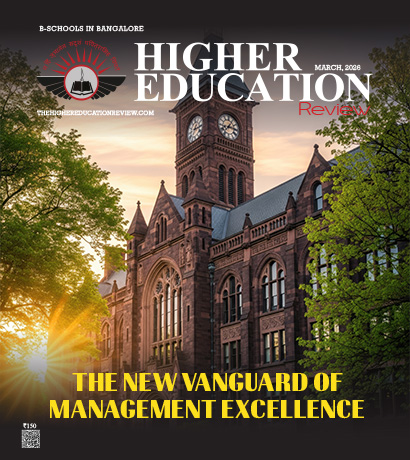Building Resilience with Young Students in the World of Tech & Job Disruptions
 Gautam Duggal, Senior Vice President of Human Resources at Citi, in an interaction with Higher Education Review, shares his thoughts on resilience as a teachable skill and the importance of preparing students for tech-driven disruptions. He highlighted the role of emotional intelligence and adaptability, as well as financial literacy, in developing future-ready talent, and also emphasized the value of mentorship, real-world experiences, and long-term career planning when building resilience and navigating evolving industries.
Gautam Duggal, Senior Vice President of Human Resources at Citi, in an interaction with Higher Education Review, shares his thoughts on resilience as a teachable skill and the importance of preparing students for tech-driven disruptions. He highlighted the role of emotional intelligence and adaptability, as well as financial literacy, in developing future-ready talent, and also emphasized the value of mentorship, real-world experiences, and long-term career planning when building resilience and navigating evolving industries.
With over twenty years of HR experience, Gautam Duggal has successfully implemented Talent & Learning strategies across medium to large businesses. He brings expertise in talent management, leadership development, recruiting, succession planning, performance management, and organizational transformations.
How can resilience be taught as a skill rather than left to life experience? What role does emotional intelligence play in preparing students for tech-driven disruptions?
Resilience has become a critical factor in today’s world. For students, the priority should go beyond developing individual skills or focusing solely on the job they want. It is also important to develop industry awareness, the country in which they work, and the socio-political and geopolitical context. This awareness prepares them for navigating potential headwinds, whether during job searching or while starting their first professional role.
A job role an individual starts with and the work that is performed will likely change due to the rapid changes in the business environment. It is important to be aware of external environment while also maintaining a clear vision of the professional goals. Such foresight provides a sense of purpose and direction, ensuring that efforts are not limited to improving current responsibilities but are also aligned with long-term aspirations. Balancing awareness of external changes with a sense of clarity enables greater adaptability to inevitable shifts in the workplace. This combination of factors fosters both direction as well as an understanding of long-term professional goals.
How can students learn to embrace failure as a stepping stone to growth in fast-changing industries?
In fast-changing businesses, the skill sets are viewed into three different dimensions. The first is technical skill set, which is gained through formal education, career experience and personal engagement. The technical skill set represents the foundation of expertise which must be continually learned and improved to stay relevant. The second dimension is behavioral skills - how one might respond to varying situations. It is critical to develop self-awareness regarding one’s innate tendencies, default styles and personal triggers in order to adapt to a professional landscape.
The third aspect is business acumen. Whether in a first job, entrepreneurship, or family business, it is important to understand how the business works as a whole, including end-to-end processes. This comprehensive understanding enables people to connect technical and behavioral capabilities to organizational requirements.
With AI and automation transforming jobs, which adaptability skills should be prioritized in education? How can students distinguish between temporary trends and long-term industry shifts?
To remain competitive, two vital skills must be developed. The first is inquisitiveness. In an ever-evolving environment, it is critical to be curious, whether by studying market intelligence, exploring areas often overlooked, or learning from the achievements of others. Innovations and successful products in one market can quickly be replicated in another, making it vital to remain alert and well-informed. Another one is the ability to assess impact. Knowing about the emerging developments and their potential impact on the market or business can help leaders to make a better-informed decision strategically. Therefore, these skills are valuable when navigating fast-moving industries with insight and clarity.
What role can mentorship play in helping students navigate uncertain job markets? How can educators ensure that resilience training also accounts for mental well-being and work-life balance?
Mentorship plays a critical role in understanding the functions of an aspirational market or industry. It is not only limited to guidance on navigating corporate interactions, it also assists in understanding the deeper insights into the industry. However, mentorship alone cannot build resilience. It can only complement the process. Resilience is developed through experience and what may be termed as “simulation.” For instance, when facing a challenge in personal or professional life, progressing through its various stages provides opportunities to learn. At these stages, mentors can provide guidance by highlighting effective and ineffective approaches.
With increased resilience, dependence on fallback options such as avoidance or the risk of mental health strain tends to diminish. A key element of resilience is mental strength - the ability to face and adapt to different situations with composure and confidence. Developing this quality equips individuals to navigate challenges more effectively in both personal and professional environment.
What real-world experiences such as internships, hackathons, volunteer projects that most effectively build resilience in tech students?
Hackathons serve as a great experience for tech students to demonstrate and develop their skills. Increasingly, companies also conduct ‘mental hackathons’ that develop their decision-making potential for people-oriented situations rather than just technical. These activities reveal how individuals behave, react and make quick decisions under pressure. Over time, volunteering activities also prove valuable, as they demonstrate whether an individual is preparing to take on larger responsibilities.
Many organizations now also conduct reverse mentoring sessions. This allows senior professionals to learn from younger employees entering the corporate world with fresh perspectives. They provide senior leaders with valuable insights into what influences younger customers, while also offering junior participants the chance to contribute ideas and gain exposure. This reciprocation not only expands awareness across generational lines, but also enhances the ability to problem-solving within the organization.
How can students prepare for multiple career pivots over their lifetime?
It is no longer necessary to prepare for a single linear career in today’s work environment. Broader experiences across multiple business functions increase the possibilities of success when transitioning to a new opportunity, and provide possibilities to return if the new direction is unfit. However, embracing new roles fosters alignment with future aspirations and expands the possibilities for professional growth.
How can financial literacy contribute to resilience in uncertain job markets?
People should understand the risk appetite. There are a number of organizations that provide financial literacy education. While salary or compensation will always be a major driver in any career, it is equally important to spend wisely. Developing this level of discipline provides the confidence to consider aspirational opportunities and pursue opportunities while staying financially secure. It also enables the individual to be more resilient and less stressed during career changes or transitions.

